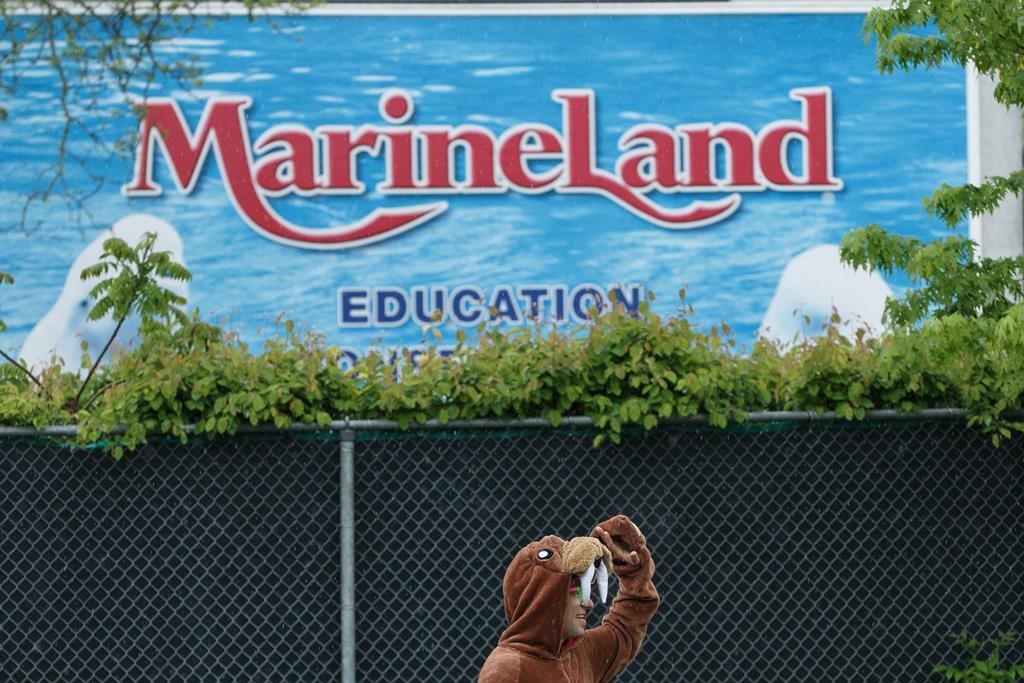Ontario has charged Marineland over the care of its black bears, but the Niagara Falls, Ont., tourist attraction denies any wrongdoing.
The Ministry of the Solicitor General said that Marineland was charged Tuesday with three counts of failing to comply with an order related to the care of American black bears.
Brent Ross, a spokesman for the ministry, said the charges have been laid under a section of the Provincial Animal Welfare Services Act that allows an inspector to issue an order to help animals that may be in distress. The facility must comply with the order or otherwise face charges.
The ministry declined to provide more details.
“Given this matter is now before the court, it would be inappropriate for the ministry to comment further,” Ross said.
Marineland said it has received a summons about the care of three bear cubs born unexpectedly at the park during the pandemic due to a birth-control failure.
The park said the province’s Animal Welfare Services team “required that Marineland construct a 10,000-square-foot facility for the bear cubs to exact specifications separate from our bear habitat.”
“We instead opted to release the bears to a sanctuary,” Marineland said in an email. “The cubs were always under regular veterinary care and were healthy.”
The park said it appreciates the work of Animal Welfare Services, “but do not believe the park’s actions justify the laying of charges under Ontario’s animal welfare laws.”
Marineland said it looks forward to defending itself in court.
The park houses an unknown number of black bears that live together in an enclosure with dens and water. Visitors can feed the bears corn pops.
In February 2020, Marineland employee Maddie Black told The Canadian Press she saved three black bear babies from the enclosure, worried they would be killed by adult male bears.
She fished them out of the bear den with a long pole and net. Marineland said it had 16 adult bears then, but the cubs were in no physical danger. The park, however, said it had concerns about the mother bears being able to care for the cubs.
The province launched an investigation into the incident.
In 2013, the Ontario Society for the Prevention of Cruelty to Animals issued an order to Marineland to build separate habitats to protect bear cubs from being mauled and devoured by adult males. Marineland said it would develop a birth control program, which the OSPCA agreed to. The park said it complied with the order by using birth control injections.
In 2016, when the Ontario Society for the Prevention of Cruelty to Animals enforced animal cruelty laws, Marineland was charged with one count of failing to comply with the prescribed standards of care for about 35 American black bears, including failing to provide adequate and appropriate food and water for them.
The Crown later dropped those charges, saying there was no reasonable chance for a conviction.
The province took over the enforcement of animal cruelty laws in 2020 after the OSPCA abdicated that role.
Since January 2020, provincial Animal Welfare Services anti-cruelty officers have been inspecting Marineland regularly, although details of the ongoing probe have not been released.
In 2021, Animal Welfare Services officers found that the marine mammals at the park were in distress due to poor water quality. On May 10 that year, they issued two orders to Marineland to repair the water system in the pools that house beluga whales, dolphins, walruses, sea lions and one killer whale.
Marineland appealed the order on May 18 that year, denying the animals were in distress, and noting that an unknown number of whale deaths at the park were not related to water issues.
Earlier this month, a beluga whale and a bottlenose dolphin died at the park.
That came following the death in March of Kiska, Canada’s last remaining captive killer whale, at Marineland.
This report by The Canadian Press was first published May 31, 2023.



